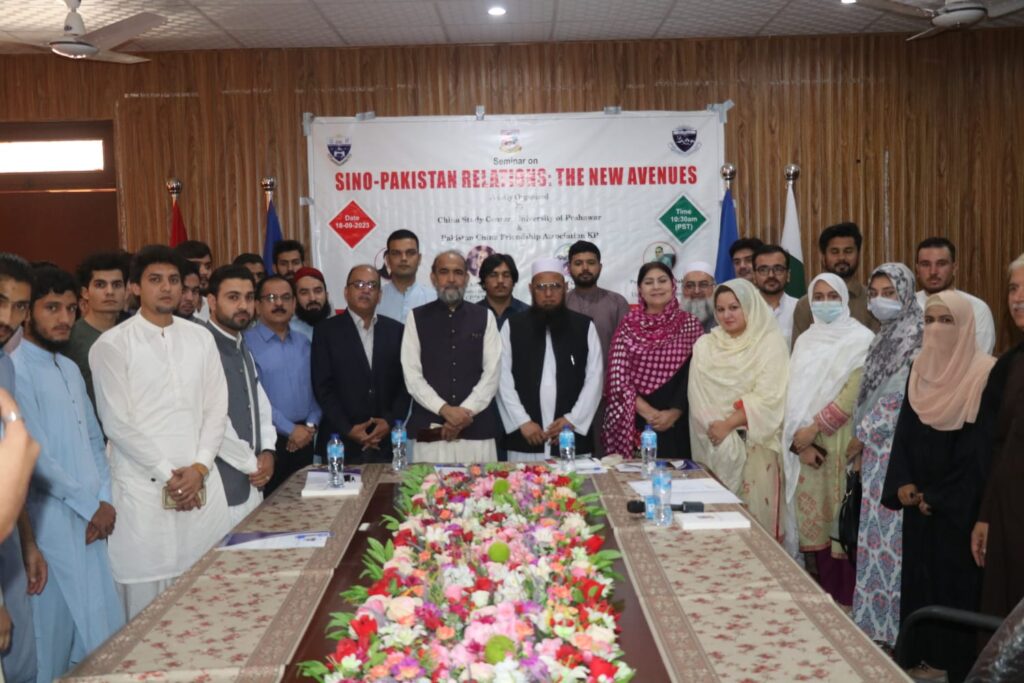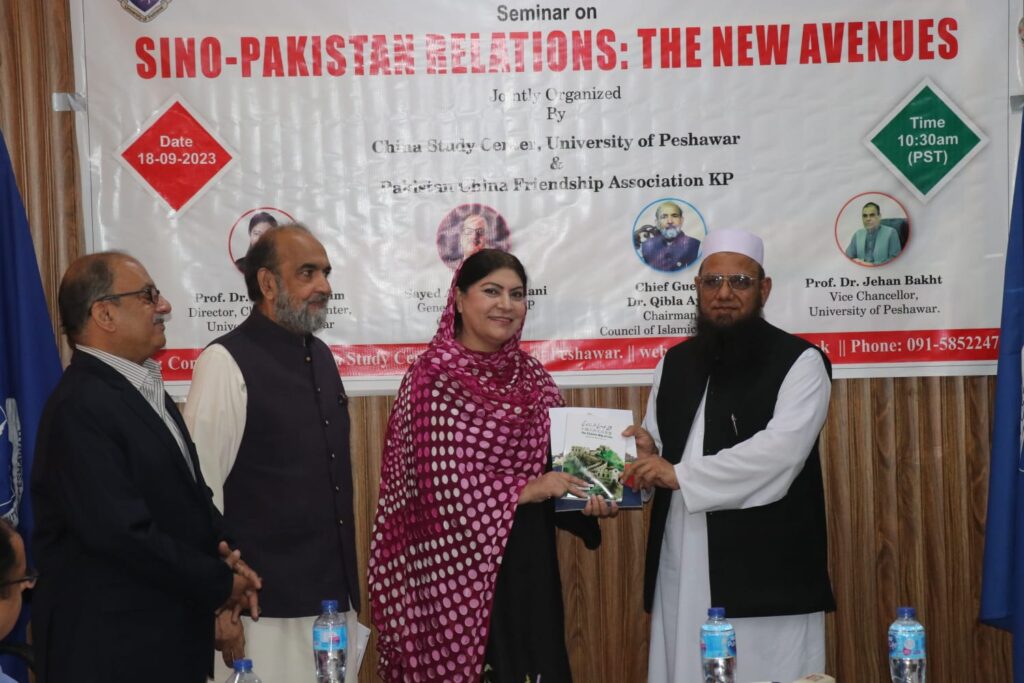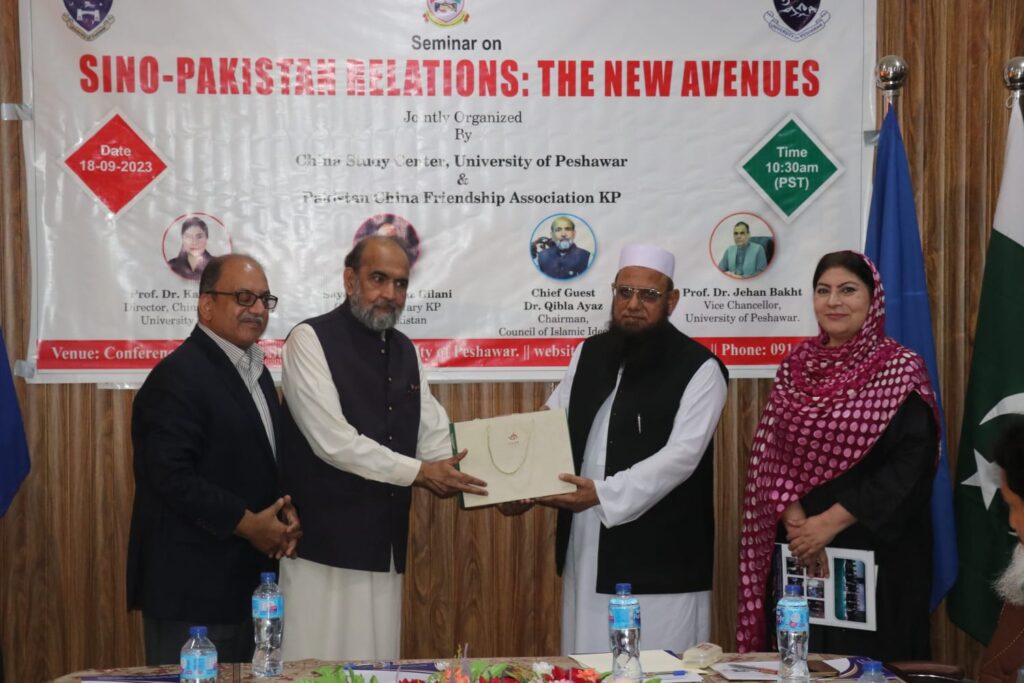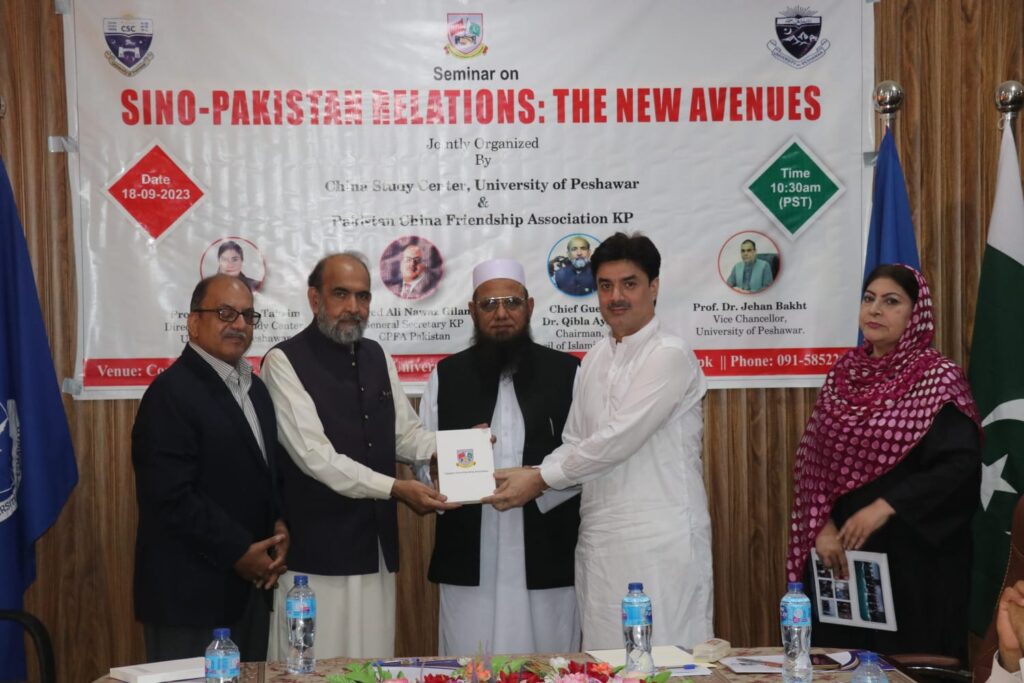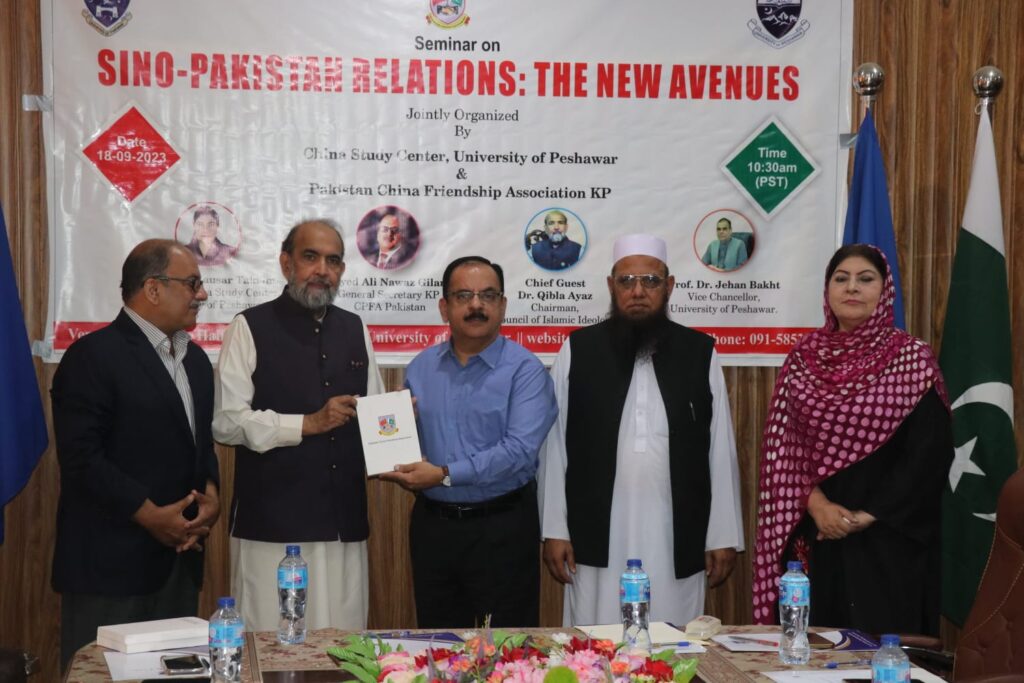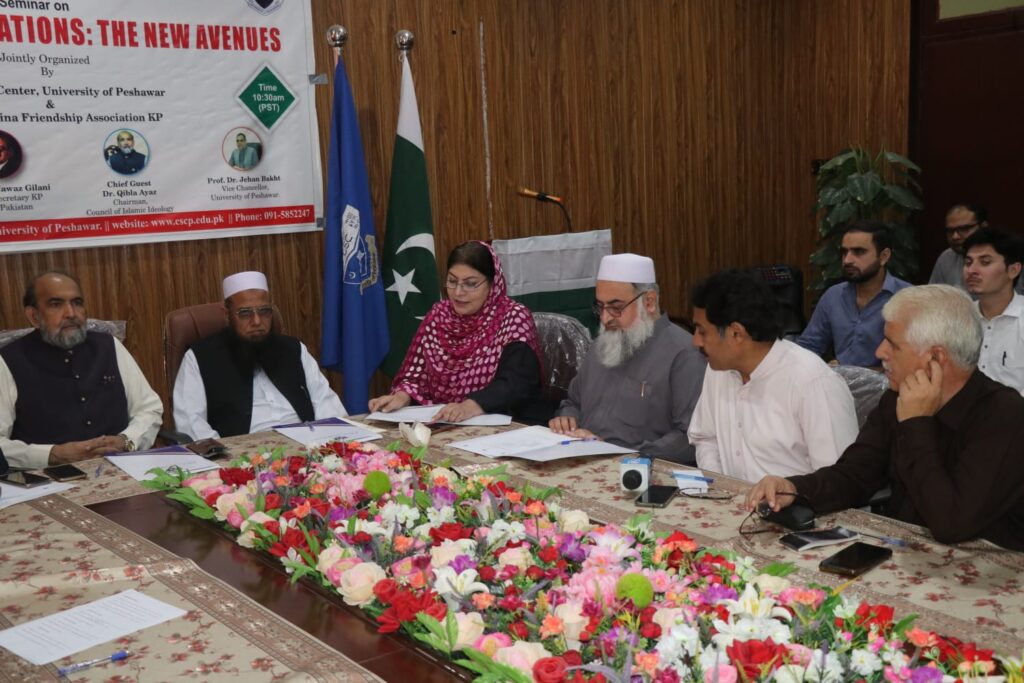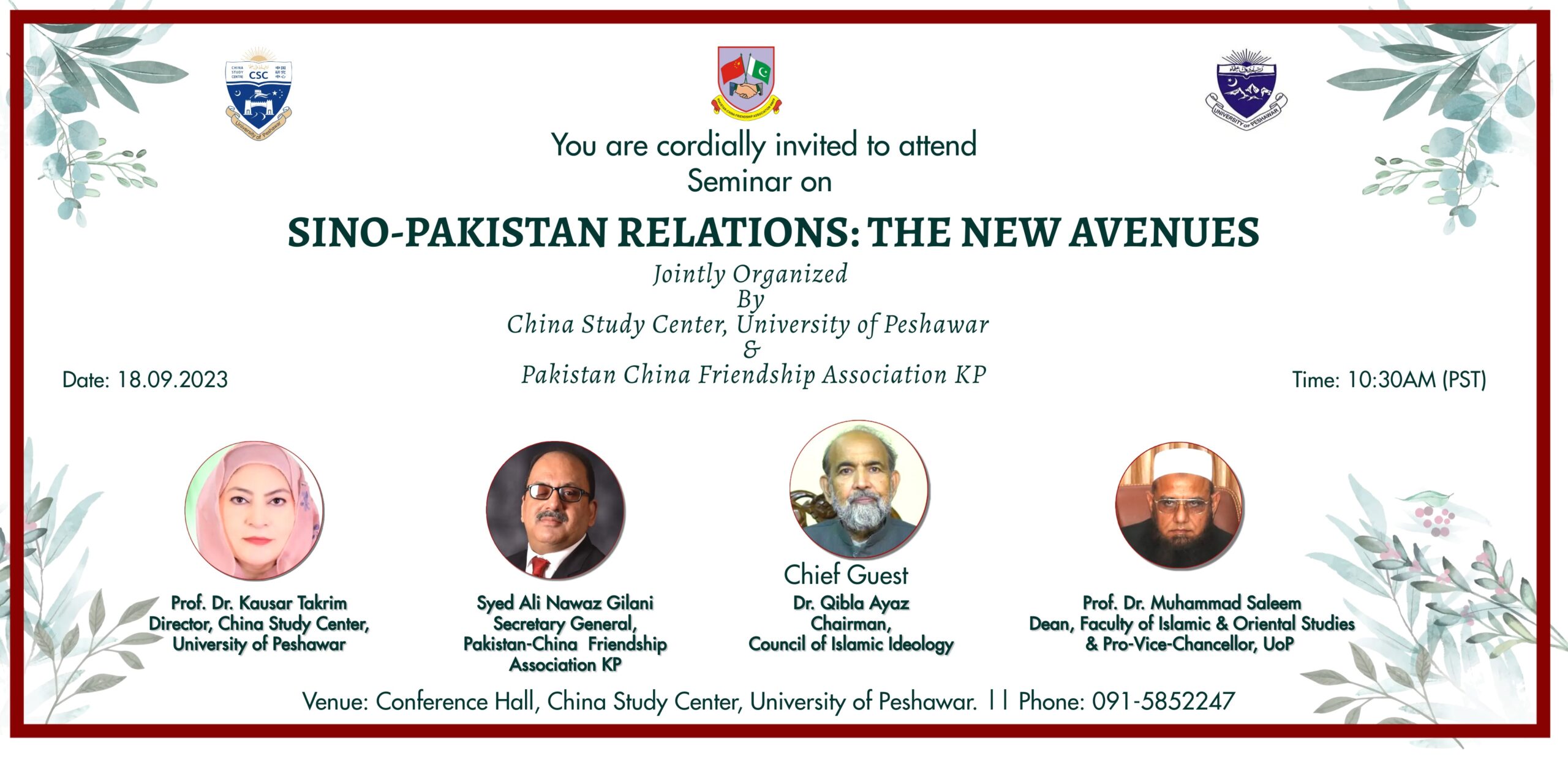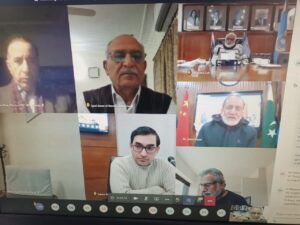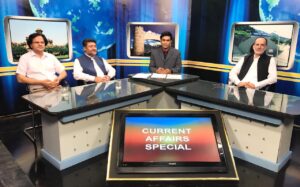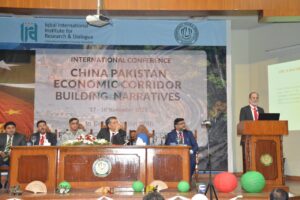China Study Center, University of Peshawar, and Pakistan-China Friendship Association, KP Chapter jointly organized a seminar titled “Sino-Pakistan Relations: The New Avenues” on September 18th, 2023 at 10:30 am at China Study Center Conference Hall.
Dr. Qibla Ayaz, Chairman Council of Islamic Ideology, Pakistan graced the occasion as Chief Guest.
The Seminar started with the recitation of the Holy Quran followed by the National Anthem of the Islamic Republic of Pakistan and the People’s Republic of China.
Prof. Dr. Kausar Takreem, Coordinator, China Study Center, University of Peshawar welcomed Dr. Qibla Ayaz, Prof. Dr. Muhammad Saleem Pro Vice Chancellor University of Peshawar, Deans, Faculty members, students, and government officials to the seminar.
She said that China-Pakistan relations are based on mutual trust and benefits. The province of Xingjiang is strategically significant to China because it has the largest oil deposits
She also emphasizes that Chinese authorities are promoting the harmonious coexistence of all the ethnic groups in the large family of the Chinese nation, protecting freedom of religious belief by the law and closely promoting the high-quality economic and social development of People’s livelihood.
Syed Ali Nawaz Gillani, Secretory General Pakistan-China Friendship Association, KP Chapter in his speech said that Pakistan and China Relations have strengthened with the passage of time. China is now Rising and Shining across the globe due to its systems and a great lesson to learn which is the need of the hour. Traditionally the relations with China are very old. Peshawar- Urumqi and Abbottabad-Kashgar have been sisters cities since 1985 and 2007 respectively. The relations between Pakistan and China today are at a high peak and we expect that both countries will continue supporting each other and will work for the progress of the people. he added
Dr. Qibla Ayaz, Chairman Council of Islamic Ideology, talked about his recent visit with the delegation from Pakistan to China. The delegation was comprised of Dr. Qibla Ayaz, Israr Madani, Tehmeed Jan Azhari, Muhammad Tayyab Tahiri, Maulana Fazl-e-Aali Haqqani, Rashid ul Haq, Maulana Atta ur Rehman, Asif Luqman Qazi, Sahibzada Sultan Ahmed Ali, and Maulana Yousuf Shah.
He said that he was highly impressed by the country’s commitment to religious freedom. He lauded China’s approach to upholding the rights of religious minorities and ensuring their full participation in the nation’s social and economic life. During the visit, the delegation met with several top government officials as well as representatives of China’s Muslim community. He was particularly impressed with China’s efforts to promote interfaith harmony and tolerance, which he noted had helped to foster a strong sense of social cohesion and harmony among the country’s diverse religious groups. He also commended China’s policies towards religious minorities, which he described as being both inclusive and accommodating. He praised the government’s efforts to provide religious minorities with equal treatment and opportunities, stating that such measures were essential to building a peaceful and harmonious society. Dr. Qibla Ayaz also praised China for its efforts to make religious texts accessible to all, including the translation of the Holy Quran into Chinese and Uyghur languages.
Dr. Qibla Ayaaz mentioned that the delegation had the opportunity to meet with Muhamad Ismail, Imam of a Masjid in Guilin, Khawaja Abbas, another Imam in Kashghar, and Abdul Raqeeb Al-Sini, head of the Islamic Academy in Aksu, Xinjiang.
In the question-answer session, Dr. Qibla Ayaz mentioned that China is taking measures to ensure that the rights of its minorities are protected without any discrimination. He noted that all minorities in China, including Muslims, were free to celebrate their religious festivals, social and cultural events. During his visit, he witnessed the treatment of minority groups, specifically Muslims, in various cities and regions in China and the government’s responsiveness to their needs and concerns. Dr. Qibla Ayaz’s findings highlight the Chinese government’s commitment to promoting multiculturalism and respect for diversity.
Prof. Dr. Muhammad Saleem Dean, Faculty of Islamic & Oriental Studies & Pro-Vice-Chancellor University of Peshawar warmly welcomed all the participants to the event organized by the China Study Center, University of Peshawar. He said that Pakistan and China have made tremendous progress under the China-Pakistan Economic Corridor, which is a flagship project of the Belt and Road Initiative (BRI). Pakistan and China have a history of strong diplomatic relations that were established in 1951. The friendship between the two countries has grown from strength to strength and is moving upwards. The Strong all-weather relationships between Pakistan and China are based on mutual trust, respect, and goodwill. The two countries have signed various agreements in the economic, defense, diplomatic, and strategic fields. He said that Cooperation between Pakistan and China in various fields, including the knowledge industry, has increased over time. The China-Pakistan Economic Corridor (CPEC) has further boosted educational cooperation and institutions of higher learning between the two countries.
In the end, Prof. Dr. Muhammad Saleem Dean, Faculty of Islamic & Oriental Studies & Pro-Vice-Chancellor University of Peshawar thanked Dr. Qibla Ayaz, Syed Nawaz Ali Gillani, and other distinguished guests and participants for their participation in the Seminar. The Seminar was followed by refreshments at the China Study Center, University of Peshawar.
A large number of students, faculty members, scholars, and expert participated in the seminar.
